Principles of Economic Liberty: The Biblical Case for Free Enterprise
A Six-Session Bible Study Series Based on the Word Foundations Series of Articles Titled “The Bible and Free Enterprise”
“The Bible and Free Enterprise” is a Word Foundations series of articles that makes the case that the free enterprise economic model, or capitalism, is biblical. While free enterprise can be distorted and abused, the distortions are departures from biblical principles and a biblical worldview. Now more than ever, Christians must understand and be able to articulate that free enterprise, or capitalism, is rooted in biblical teachings and fosters qualities the Scripture commends. Not convinced? In this six-session series, you’ll encounter overwhelming evidence. The Bible is not silent about economic freedom!
Session 5
PRINCIPLES SEVEN AND EIGHT
PROPERTY RIGHTS
Now what liberty can there be where property is taken away without consent?
—Samuel Adams—
The principles covered in this session are highlighted in part 3 of “The Bible and Free Enterprise.”
Begin by reminding participants that you’re traveling together on a journey to explore ways that capitalism, or the free enterprise economic model of financial exchange, aligns with biblical teachings. Say: Our journey is placing ten principles before us. These tenets have been derived heavily, but not exclusively, from a paragraph appearing in an article by Dr. Ronald Nash affirming capitalism as biblical.
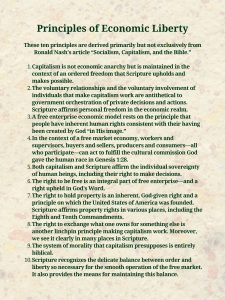
A PDF file of the above graphic is available here.
During this session we will examine principles 7 & 8 on our list.
-
-
- The right to hold property is an inherent, God-given right and a principle on which the United States of America was founded. Scripture affirms property rights in various places, including the Eighth and Tenth Commandments.
- The right to exchange what one owns for something else is another linchpin principle making capitalism work. Moreover, we see it clearly in many places in Scripture.
-
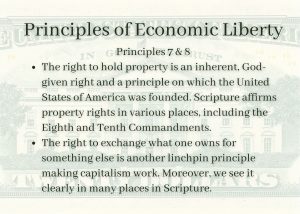
A PDF file of the above graphic is available here.
Remind participants that in this session you are covering the last two of the four inherent rights that Ronald Nash specifically names in his paragraph describing capitalism.
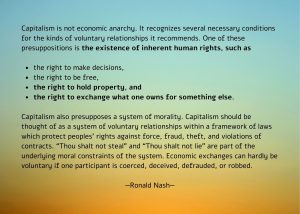
A PDF file of this graphic is available here.
It’s Impossible to Overstate the Importance of Individual Property Rights
In advance: Acquire a MONOPOLY® game to use during the session. Display it at the beginning of the session.

Say:
-
-
- We are going to attempt to create a new edition of MONOPOLY®. Our new game will be starkly different from the version with which we’re all familiar.
- In our new version, everything is collectively owned, or owned by the bank or government—throughout the entire game. Players cannot buy or trade properties, deeds, or improvements on properties.
- Against the backdrop of this requirement, the goal of our game is to create and increase wealth as the game progresses, so that each player is able to benefit, and have his or her needs met, from the “success” of the group as a whole.
-
Ask: What will playing this game “look like”? What will be some of the game’s rules? Facilitate a discussion in your group, asking participants to tackle the challenge. More than likely, they will find that creating and increasing wealth without the individual right to own and manage property and is not just difficult, but impossible.
Point out that MONOPOLY® has been criticized for being too harsh. According to the Wikipedia article on the game,
Wired magazine believes Monopoly is a poorly designed game. Former Wall Streeter Derk Solko explains, “Monopoly has you grinding your opponents into dust. It’s a very negative experience. It’s all about cackling when your opponent lands on your space and you get to take all their money.”
Emphasize that MONOPOLY® as we have known and experienced it through the years does not mirror capitalism perfectly. In fact, one of the traits the game fails to reflect is the frequency of transactions of mutual benefit that make free markets, and countries that rely on them, thrive.
The point of this exercise is to show how essential private property rights are to individuals’, and thus a nation’s, ability to create and increase wealth.
Principle Seven
The right to hold property is an inherent, God-given right and a principle on which the United States of America was founded. Scripture affirms property rights in various places, including the Eighth and Tenth Commandments.

The following paragraph is adapted from Principles of Liberty: Ten Biblical Truths Embedded in the Declaration of Independence: A Five-Session Bible Study Series, Session 2:
According to an article at conservapedia.com, “The Declaration of Independence drew upon Christianity and the Enlightenment English philosopher John Locke.”
-
-
- Though Locke often is described just as this article characterizes him — as an “Enlightenment English philosopher” —
- John Locke’s thinking actually had biblical and theological underpinnings, even bringing him to a point at which “he was considered a theologian by his peers and by subsequent generations.”
- This is not to say that all his views aligned with Scripture, but that he cannot accurately be thought of as a purely secular philosopher.
- In his influential work Two Treatises of Government, published in 1689 — a work from which the Founders who wrote and ratified the Declaration drew — Locke said this: “The end of law is not to abolish or restrain, but to preserve and enlarge freedom.”
-
The end of law is not to abolish or restrain, but to preserve and enlarge freedom.
—John Locke—
Play this short video for your group.
In advance: Go to “No Property Rights, No Freedom; Know Property Rights, Know Freedom” and read through the quotes on that page.
During the session: You’ll be reading these quotes together as a class. Ask for volunteers to read them aloud.
-
-
- Here is a numbered list you can use for reference. The quotations on it are identical to those on the webpage.
- Here is a numbered list with each quote spaced apart from the others so you can cut out each item and distribute the quotes to volunteer readers.
-
Do not feel you have to use every quote. Reading through all the quotes, however, will be a quick and easy way to emphasize
-
-
- what property rights are,
- why they exist,
- why they are important,
- what government’s role ought to be in relation to them, and
- why the Founders believed so strongly in them.
-
In advance, cut the quotes into individual items and distribute them to volunteers who are willing to read them aloud. Some volunteers may need to read more than one quote. Using either
-
-
- your reference sheet and the numbers assigned to the quotes or
- the presentations of the quotes provided online (you can begin with the first one by John Locke and visit all the quotes in sequence by clicking next… on each page),
-
call on volunteers to read their assigned items.
Before beginning, it may be helpful to remind participants that you are reviewing Principle 7 on our list of ten ways the free enterprise system aligns with Scripture. That principle states,
The right to hold property is an inherent, God-given right and a principle on which the United States of America was founded. Scripture affirms property rights in various places, including the Eighth and Tenth Commandments.
Here is the outline for the arrangement of the quotes:
-
-
- LOCKE’S WRITINGS WERE AN IMPETUS FOR THE AMERICAN REVOLUTION (quotes 1-3; here is quote #1)
- THE FOUNDERS AND EARLY LEADERS OF AMERICA WERE INFLUENCED BY LOCKE (quotes 4-23; here is quote #4) When you get to quote #4 (a statement in which John Adams mentions the Eighth and Tenth Commandments; see Ex. 20:15,17), briefly discuss how these commandments uphold property rights. Interestingly, both these Commandments assume the reality of private ownership and management of wealth, property, and resources. Share that the term inviolable in the fourth quote means not to be violated or broken.
- AMERICAN LEADERS THROUGH THE YEARS HAVE AFFIRMED PROPERTY RIGHTS (quotes 24-26; here is quote #24)
- PROPERTY RIGHTS MUST BE GUARDED AND UPHELD, EVEN AGAINST A PUSH TO VIOLATE THEM FOR THE “GREATER GOOD” (quotes 27-30; here is quote #27)
- CORRECTING “INCOME INEQUALITY” DOES NOT JUSTIFY VIOLATING PROPERTY RIGHTS (quotes 31-33; here is quote #31)
-
As the quotes are read, you may want to discuss some of them briefly. Note how relevant the Founders’ understanding is for today.
What About income Inequality?
Note that the last point on the outline deals with income inequality, a very hot topic today. Use the following PragerU presentation by John Tamny to stimulate your group’s thinking on this issue. Briefly discuss some of the reasons Tamny gives in making the case that income inequality is good. Here is a transcript of his presentation. Say: It is the free enterprise system with its emphasis on property rights makes the purchases of the wealthy beneficial to all in the long run.
It is the free enterprise system with its emphasis on property rights makes the purchases of the wealthy beneficial to all in the long run.
Also important to understand is this point, which Prime Minister Margaret Thatcher made effectively when responding to a Member of Parliament. This video is only two-and-a-half minutes long.
Ask and discuss: Which is more compassionate and beneficial to the poor — for the poor to be richer, even though the gap between the rich and the poor is wider, or for the poor to be poorer, as long as the gap between the rich and the poor is more narrow?
Check Your Motives
Suggest that people need to ask themselves this question:
If the needs of the poor could be met without taking away resources from the rich, would I support such an approach, or would I instead favor one that demanded that the rich surrender their resources to help the poor?
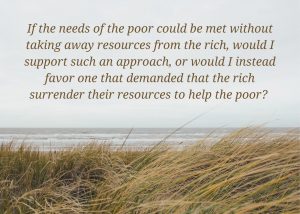
A PDF file of this graphic is available here.
If an individual won’t readily support an approach that helps the poor without penalizing the rich, then he or she clearly is more concerned about hurting the rich than helping the poor.1
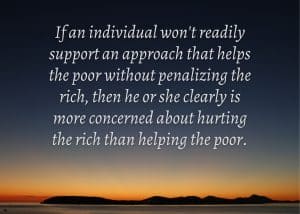
A PDF file of this graphic is available here.
The Biblical Case for Property Rights
Emphasize that even though the seventh principle specifically mentions the Eighth and Tenth Commandments, the Bible doesn’t uphold property rights in the Eighth and Tenth Commandments only. You’ll recall that the Eighth Commandment forbids stealing and the Tenth forbids coveting.
Ask participants to look up Ephesians 4:28, a verse you probably considered previously but didn’t necessarily emphasize. In Ephesians 4:28, Paul wrote, “Let him who stole steal no longer, but rather let him labor, working with his hands what is good, that he may have something to give him who has need.”
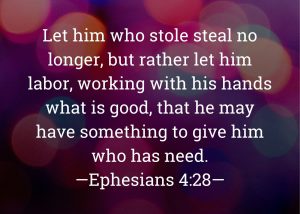
A PDF file of this graphic is available here.
Point out that in this verse we see many elements of free enterprise upheld.
-
-
- no stealing (thus respecting others and their rights over their own property)
- engaging in constructive work
- engaging in productive work
- private property rights—The verb translated he may have means to own or possess. (See the graphic below. Here is the page from www.blueletterbible.org showcasing the information.)
- encouragement but not coercion, to give to those in need
- treating others with dignity and respect
-
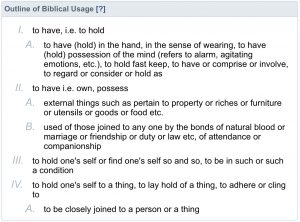
A PDF file of this graphic is available here.
Say: As we soon will see and be reminded, other passages in the Old and New Testaments affirm property rights as well.
Principle Eight
The right to exchange what one owns for something else is another linchpin principle making capitalism work. Moreover, we see it clearly in many places in Scripture.
As early in Scripture as Genesis 23, we see a clear affirmation of the free enterprise system, especially with regard to property rights, and especially with regard to the right to exchange what one owns for something else.
Background information: Sarah, Abraham’s wife, has lived for 127 years, and she dies. Abraham wishes to bury Sarah in a certain cave, but he is a foreigner in that land. He negotiates with Ephron, the owner of the cave and the field in which the cave is located, a fair price for the property. The negotiation takes place in the presence of “the people of the land, the sons of Heth” (v. 7). As we noted in “The Bible and Free Enterprise, Part 3,”
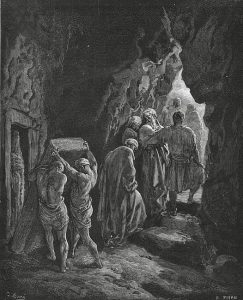
After “Abraham weighed out the silver for Ephron which he had named in the hearing of the sons of Heth” (v. 16) and paid him, the property was “deeded to Abraham as a possession” (vv. 17-18). Following the transaction, the money that previously had belonged to Abraham was Ephron’s, and the field that earlier been Ephram’s now belonged to Abraham.
It is difficult to overemphasize the importance of this passage of Scripture. Hear what historian David Barton says about it in the following clip from the February 6, 2020 episode of Walbuilders Live! The first voice you’ll hear will be that of co-host Rick Green.
Background information: Numerous early settlers in North America were heavily influenced by the Bible and the biblical principle of property rights. You can learn more from this expanded clip excerpted from the same WallBuilders Live! program.
Make copies of and distribute this discussion guide to your participants. Use it to launch a discussion and to emphasize the Bible’s affirmation of an individual’s right to exchange what one owns for something else.
You also may wish to cite a few or all of the following passages to drive home the point. The following paragraphs have been adapted from “The Bible and Free Enterprise, Part 3.”
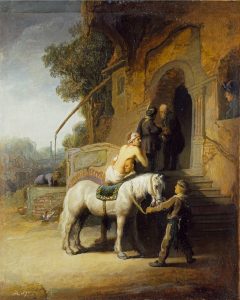
-
-
- Genesis 23:1-20, of course, is but one Bible passage.
- In the eight parables of Jesus we considered in our discussion of Principle 6 during Session 4,“the right to exchange what one owns for something else” is a given.
- It’s also a given in these passages (some of which we’ve also considered previously).
- Note that in Acts 5:1-9, even when Ananias and Sapphira paid with their lives for lying to the Holy Spirit about the amount of money they had contributed to the church, Peter affirmed their property rights. He said to Ananias,
-
Ananias, how is it that Satan has so filled your heart that you have lied to the Holy Spirit and have kept for yourself some of the money you received for the land? Didn’t it belong to you before it was sold? And after it was sold, wasn’t the money at your disposal? What made you think of doing such a thing? You have not lied just to human beings but to God (Acts 5:3-4 NIV).
-
-
- There’s more. These three passages (Proverbs 23:23; Isaiah 55:1-2; Revelation 3:18) speak of “buying” intangible assets. While they are emphasizing the importance of acquiring spiritual treasures, the analogy used assumes individual sovereignty and the right of choice. Individual freedom prevails in both the economic arena and with regard to spiritual benefits.2 While spiritual assets definitely can’t be bought with money—the passages make that clear—we do see the principles of freedom and ownership upheld.
-
Without Property Rights, People Cannot Live in Freedom
Note that Karl Marx said, “The theory of Communism may be summed up in one sentence: Abolish all private property.”
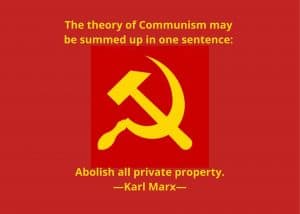
A PDF file of this graphic is available here.
The Founders of the United States of America, however, understood that property rights were natural rights—rights given by God. They knew that government’s responsibility was to protect those rights.
William Blackstone (1723-1780) was a British lawyer, judge, professor of law, and a member of Parliament for nearly a decade. He “was no friend to the American Revolution,” but His Commentaries on the Laws of England with its
clearly-stated emphasis on the authority of the law of nature and the absolute rights of individuals was of particular importance in formulating and defending the case for armed resistance to King George and his parliament… The Commentaries thus became and remained the basis of US legal education, hence moulding American legal thought and practice throughout the nineteenth century, and beyond.3
Blackstone said,
And these great natural rights may be reduced to three principal or primary articles: 1) the right of personal security; 2) the right of personal liberty; and 3) the right of private property; because as there is no other known method of compulsion, or of abridging man’s natural free will, but by an infringement or diminution of one or other of these important rights, the preservation of these, inviolate, may justly be said to include the preservation of our civil immunities in their largest and most extensive sense.
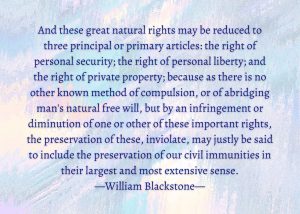
A PDF file of this graphic is available here.
Property Rights Benefit Everyone, Including the Poor
But how do property rights benefit the poor? Lawrence W. Reed of the Foundation for Economic Education sheds light on this matter. He wrote,
In Jesus’s teachings and in many other parts of the New Testament, Christians — indeed, all people — are advised to be of “generous spirit,” to care for one’s family, to help the poor, to assist widows and orphans, to exhibit kindness and to maintain the highest character. How all that gets translated into the dirty business of coercive, vote-buying, politically driven redistribution schemes is a problem for prevaricators with agendas. It’s not a problem for scholars of what the Bible actually says and doesn’t say.
Property rights make charity and generosity possible. Any help afforded the poor through coercion cannot be charity or generosity but forced redistribution of wealth. Thus, property rights give the owners of resources opportunities to be generous to help the poor; and they afford the poor the authority to use the resources they have (including those they have been given) to improve their situations.
Thus, in commending and commanding a “generous spirit,” the Bible implicitly affirms property rights.
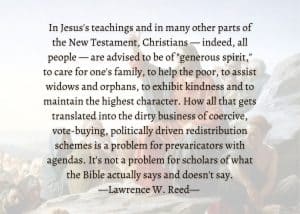
A PDF file of this graphic is available here.
Close in prayer. Father God, thank You for the freedoms that are rooted in property rights — rights you have afforded us because You have made us in Your image. We pray that more will come to understand the link between freedom and each person’s right to own and manage his or her own resources and wealth. Help us to use the resources we own wisely and for your glory. In Jesus’ name. Amen.
Looking Ahead
Session 6 will explore the theme of ethics. Divine guardrails makes the free enterprise system possible and functional. These principles are highlighted in part 3 of the series “The Bible and Free Enterprise.”

A PDF file of this graphic is available here.
-
-
- Session 6 is available here.
- List of Principles of Economic Liberty
- Principles of Economic Liberty Bible Study Home Page
-
Dig deeper: “PRIVATE PROPERTY OWNERSHIP IS THE ONLY WAY TO ERADICATE POVERTY” by Tom DeWeese
Copyright © 2021 by B. Nathaniel Sullivan. All rights reserved.
top image credit: Photo by Tierra Mallorca on Unsplash
Notes:
1This observation isn’t original with me, but, unfortunately, I do not recall its source.
2Alvin J. Schmidt, How Christianity Changed the World, (Grand Rapids: Zondervan, 2004), 205. Dr. Schmidt wrote, “Just as God does not want people to be coerced in spiritual matters, so too he does not want them to be coerced in earthly matters, for instance, in their economic activities.”
3Wilfrid Prest, cited in this article.
Unless otherwise indicated, Scripture has been taken from the New King James Version®. Copyright © 1982 by Thomas Nelson, Inc. Used by permission. All rights reserved.
The Scripture quotation marked NIV is from The Holy Bible, New International Version®, NIV® Copyright © 1973, 1978, 1984, 2011 by Biblica, Inc.® Used by permission. All rights reserved worldwide.
top image credit: Thomas Jefferson’s rough draft of the United States Declaration of Independence
